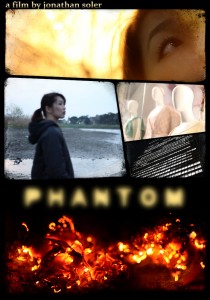
Director: Jonathan Soler
MPAA Rating: NR
Film Pulse Score: 1/10
Although not the norm, some important and truly great films have been made as “two-handers” – essentially a movie with just two characters or at least two main characters. There is My Dinner with Andre, Conversations with Other Women, Scenes from a Marriage, and Richard Linklater’s Before Trilogy (Before Sunrise, Before Sunset, and Before Midnight). French director Jonathan Soler’s first feature film attempts the same sparse treatment but with decidedly different results. I could hardly make it through the 75-minute running time that presents a conversation of a young Japanese couple for reasons on which I will elaborate below.
The characters are simply listed as “Woman” (Yuki Fujita) and “Man” (Masato Tsujioka). It is only from a press release about the film that I knew the conversation is occurring while the couple is together rather than, say, taking place over the phone. They are apparently in her bedroom and talk all night. Actually, it is she who does most of the talking; “Man” is given far fewer words to say and when he does speak, it is almost entirely in response to some long-winded speech “Woman” has just delivered.
She speaks on several specific topics but with the common theme being her disillusionment with her life. She is in her late 20s or early 30s it seems – he is likely of the same age – and she and he are both temporary workers. She spends a great deal of time complaining about her lot if life as a woman no profession, no social standing, no financial resources, and has no real effect on her community. Despite the fact that she is having this conversation with her boyfriend, the fact that she has him seems to escape her otherwise gloomy assessment of her life. She seems to be educated enough and there is a discussion of proletarian literature that suggests as much although it also appears to be out of place given the conversation’s near-constant emphasis on her unhappy existence.
The dialogue is incredibly boring. And, yes, I agree with those who would respond that “boring” is in the “eye and/or ear of the beholder.” But it is certainly my opinion that nearly every observation about her life is banal in the extreme. Perhaps this problem could have been remedied – at least a little – by what could have been shown on film during the conversation. Soler should have copied the films I mentioned in the first paragraph and actually shown the conversation – in this way, we could have seen the couple’s expressions and perhaps be given some emotional context in which to put “Woman’s” musings. Instead, we are shown multiple scenes of a Japanese town and segments of the couple talking, but doing so at moments other than the conversation to which we are listening. These latter scenes therefore look like a bad lip-syncing job by the filmmakers and there is no connection between these scenes and the dialogue.
Phantom is easily one of the most exasperating films I have ever seen. It took me days to watch it because I kept stopping it every 10 minutes or so and moving on to watch something else more enjoyable. I do not discount the real problems faced by “Woman” or her sincere disappointment with her life and her relationship or lack thereof with her parents. But I could never feel for her because the script was so trite, the dialogue so stifling. I just wanted the film to end and rejoiced when it finished on a hopeful note that came as a complete surprise given all the moaning that had come before. This is not a film on which to waste 75 minutes of your valuable time.






